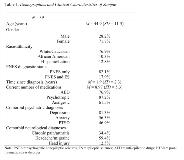Characterization of Subjective Seizure Semiology in Patients With Psychogenic Nonepileptic Seizures: A Mixed Methods Approach
Abstract number :
3.377
Submission category :
11. Behavior/Neuropsychology/Language / 11A. Adult
Year :
2018
Submission ID :
501513
Source :
www.aesnet.org
Presentation date :
12/3/2018 1:55:12 PM
Published date :
Nov 5, 2018, 18:00 PM
Authors :
Anson Kairys, University of Colorado; Meagan Watson, Universtiy of Colorado, Anschutz School of Medicine; Randi Libbon, University of Colorado; and Laura Strom, University of Colorado
Rationale: Psychogenic Nonepileptic seizures (PNES) are paroxysms that typically resemble epileptic seizures (ES) but lack aberrant epileptiform activity. A diagnosis of PNES is the most common differential diagnosis when evaluating ES and is highly prevalent in patients who present for evaluation in epilepsy monitoring units. Still, these events are often poorly characterized and managed. Research supporting effective treatment for PNES is limited, due partially from the heterogeneity observed in this population. There is a need for increased understanding of this heterogeneity to improve treatment targets. Gaining an understanding of how patients describe their PNES events, and how these descriptions relate to clinical outcomes, may lead to valuable insights leading to improved treatment in this population. Methods: Study subjects (n=39) are patients with PNES verified by electroencephalogram and enrolled in treatment. The current study applied a mixed-methods approach to characterize patient’s descriptions of their seizures using patient self-reported seizure diaries.Qualitative coding was applied to the seizure descriptions in attempt to develop parsimonious categories of events. We then examined relationships between these descriptions and commonly observed patient characteristics of coping style, dissociation, illness perception, anxiety, depression, and chronic pain using partial correlations, controlling for the effects of age and gender on outcomes. Results: Qualitative analysis of 655 seizures (n=39) revealed six seizure categories with excellent inter-rater reliability (k=0.85): motor, loss of awareness, autonomic reactivity, change in cognition, pain, and crying or other emotions. Correlations showed patients with a higher percentage loss of awareness believe their illness will continue longer (p = 0.048), cope with their illness using less distraction (p = 0.001), instrumental support (p = 0.037), and emotional support (p = 0.023) and reported more frequent depersonalization (p = 0.03). Patients with events characterized by more autonomic reactivity received less emotional support (p = 0.04) and reported more frequent amnestic dissociation (p = 0.008). Patients with more changes in cognition during events were more upset by their illness (p = 0.012), had more symptoms of post-traumatic stress disorder (p = 0.001), and experienced more frequent amnestic dissociation (r = 0.55, p < 0.001) and depersonalization (p = 0.001). Patients with higher percentages of pain events reported receiving more emotional (p = 0.037) and instrumental (p = 0.04) support. In a subset (n=25), patients with more loss of awareness during events, reported more pain-related disability (p = 0.04). Patients with more change in cognition events reported higher levels of depression (p=0.003) and anxiety (p = 0.01). Conclusions: These results suggest that mixed-methods research is feasible in the PNES population. Further, results suggest important differences exist between patient’s descriptions of their PNES events and these differences highlighting differences in how patients cope with their illness, the subtype of dissociation they experience, and their emotional reactions to their symptoms. Treatment targets may be informed by this approach to research in PNES. Funding: Not applicable

.tmb-.jpg?Culture=en&sfvrsn=f9c036be_0)